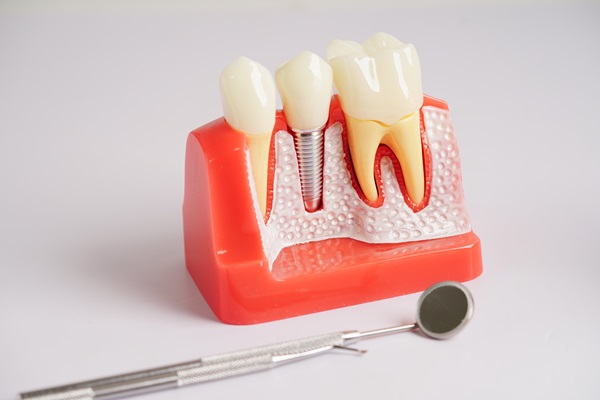How Long is the Process for Placing Implant Crowns?

If someone is looking for an alternative to placing new dental implants, they may be interested in one of the newest procedures on the market—implant crowns. If a patient chooses to go this route, there are some factors to consider before committing to the procedure, including how long it will take to place the crown on the teeth and whether or not they are the right choice in the first place.
What are implant crowns?
Implants can correct a single missing or multiple missing teeth and may be placed as an alternative to bridges, dentures, or partials. Implants are a permanent foundation for replacement teeth that look, feel, and function like natural teeth. The person who has lost teeth can eat virtually anything and smile confidently, knowing that teeth appear natural and that facial contours will be preserved. People who have had dental implants say they just feel better about themselves. With implants, people find it easier to chew their food which helps them feel more satisfied after meals and helps them to control their weight. Many patients state that having dental implants has changed their lives in amazing ways—giving them back a quality of life they had not had in years.
An overview of the procedure
The first step in placing a crown will be to prepare the mouth by removing any remaining natural teeth and removing a small amount of bone from where the implant will be placed. The dentist will then make a space in the mouth called a pocket around the implant, which will house it during its healing period. An impression of the patient's jaw will be taken next and sent to a dental lab to create an artificial tooth called an implant crown that resembles the original tooth as closely as possible. Once finished, two things can happen: The patient can have their tooth crowned immediately or wait to have them crowned later.
Recovery time
The time it takes to get back to normal can vary. How long it takes depends on the patient's overall health, your body's ability to heal, and how well you care for yourself throughout your recovery. If the patient is in good health and following instructions, they should be up and around quickly. It might take several weeks before all of your swellings goes down, but when it does, most people are thrilled with their new smiles. Patients might even want to show that beautiful smile at their next social event!
Who can benefit from this treatment?
Patients who have one or more teeth missing in an area of their mouth can be treated with dental implants. Dental implants help stabilize existing teeth and protect the remaining natural teeth from shifting out of place by replacing missing teeth. Since every patient's situation is different, it is important to consult a cosmetic dentist before treatment to determine which procedure would be most beneficial.
Patients in good general health without any preexisting medical conditions are ideal candidates for implant treatments. Treatment time varies on a case-by-case basis depending on how many implants need to be placed and what type of procedure will replace lost teeth.
Understanding more about implant crowns
The process of placing an implant typically takes two to three visits. The dentist will first place a temporary crown on the tooth while waiting to place the final crown. In the meantime, they will monitor the patient's gums and ensure there are no complications. Once the teeth have healed and been cleared by the dentist, the patient will return to get fitted for their permanent crown. This will be the crown that the patient will have for the foreseeable future.
Crowns are often used to improve the look and function of a smile after many years of wear or damage from decay or trauma. They can also be used as a replacement for missing teeth that cannot be restored with dental implants or dentures. While it may seem like it takes a while, this process is designed with patient comfort in mind and will result in a long-lasting restoration.
If a patient does not want to wait longer than necessary, they should contact their dentist today to set up a consultation. A dentist walks each patient through every step of the process and answers all questions fully. The result is a beautiful smile that patients can be proud of once again.
Request an appointment here: https://smilesnashville.com or call New Image Dentistry at (615) 591-4490 for an appointment in our Franklin office.
Check out what others are saying about our dental services on Yelp: Implant Crown in Franklin, TN.
Related Posts
Dental implants are more secure than removable dentures. These restorations can make smiling, speaking, and eating more stable. Embarrassment and awkwardness will be non-existent once these restorations are in place. Here are the details on how dental implants can serve as solid dental replacements.Osseointegration is the process behind the strength and stability of dental implants.…
Dental implants are the preferred tooth replacement for many patients and dentists. Though they have many advantages, one must be a good candidate to enjoy their benefits. Here is a closer look at dental implants and what makes someone a good candidate for them.A dental implant is a small screwlike metal post that a dentist…
Dental implants can replace all or a few missing teeth. One of their most attractive benefits is that they can last a lifetime with proper care. However, the dental implant process can take longer than some people realize. Here is a breakdown of the process and what patients can expect.Before one can receive dental implants,…
Dental implants offer a long-term solution for people missing one tooth or multiple teeth. This tooth replacement option can restore the function and appearance of your smile. While dental implants are an effective treatment option for many patients, there are several important factors to consider before undergoing this procedure. Here is what you should know…
